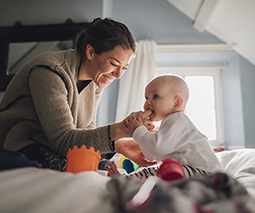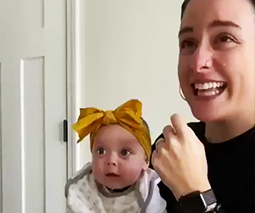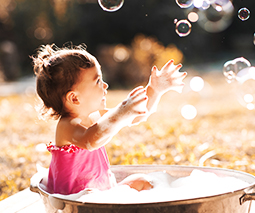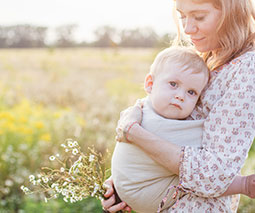Baby talk: The ‘silly’ thing parents can do to improve their baby’s vocabulary

Baby talk: It’s something that is so common and so automatic, it seems to be buried deep within our subconscious – but why do we start saying coochy-coo in a singsong voice whenever we see a baby?
Is it a silly habit? Or a symptom of not getting enough sleep with a newborn around?
BabyLab, a new podcast from Babyology, created in collaboration with Western Sydney University, is digging through the science to answer all the questions we have about baby talk and how babies learn to communicate.
Why all the baby talk?
It’s quite challenging to figure out what the sources of baby talk are because we all do it when we see a baby. But research suggests that there are several reasons why parents do it.
Dr Marina Kalashnikova, a researcher in infancy studies, explains: “Language is one of the most complex systems that a human being can acquire and our little babies learn it in just a couple of years and they’re remarkable at doing it. By the time of their first birthday, they are saying their first words which is very fascinating.”
Especially if we consider that they can barely walk, tie their shoes, or feed themselves at 12 months.
But learning language from adults is challenging for babies. “When we talk to each other, we don’t produce the cleanest form of language,” explains Marina. “We tend to interrupt each other, we don’t finish our sentences, or sometimes we speak so fast, it’s not clear what sounds we are producing. That’s what led researchers to suggest that babies need some kind of internal structure that allows them to basically navigate through this messy input and still learn language successfully.”
Listen to the full Baby talk episode on BabyLab:
Baby talk starts to make sense
“It is undeniable that babies learn language from the speech that they hear from around them,” Marina says. And with infant-directed speech – the technical term for baby talk – the type of language that babies hear is perhaps not so messy. “We actually slow down, and exaggerate the structures in our speech, to help babies learn it better.”
Denis Burnham, Research Professor of Speech and Language at The MARCS Institute for Brain, Behaviour and Development, expands on this further. “We know that when mothers talk to infants, they go up and down with their pitch. When we do recordings and play it back without the words, there’s more emotion in their voice, and what we call vowel hyperarticulation – the exaggeration of the vowel sounds.”
“All languages of the world have ee oo and aa sounds. When parents talk to infants, they exaggerate that space between ee oo and aa, so that the distance between them is bigger, when they talk to infants. So they’ll say to a baby, ‘Loooook there’s a sheeeeep’.”
And astonishingly, the degree to which parents exaggerate those vowels has a direct relation to their baby’s later vocabulary. “If mothers exaggerate the vowels more, infants will have better vocabulary at 18 months,” Denis says.
So, baby talk – and sounding silly – might actually be the most helpful thing you could be doing to teach your baby to talk.
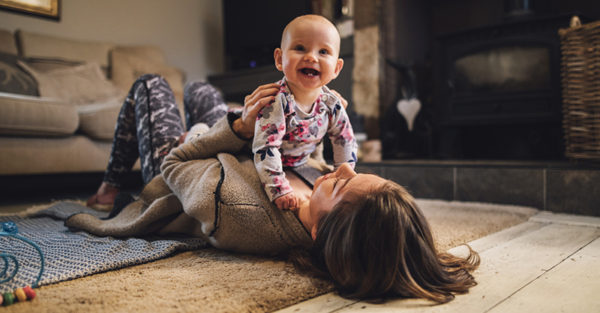
Baby talk and emotional development
Baby talk also plays a vital role in your baby’s emotional development.
“It’s actually really important to speak in a funny way when you’re talking with a baby. It’s providing a connection with your baby and helping them stay interested in speech, and wanting to be a part of that conversation,” explains Dr Christa Lam-Cassettari, an infant researcher at the MARCS Institute at Western Sydney University.
“Decades of research on baby talk [shows] it is good for babies because it engages them in conversations – so it’s basically highlighting, ‘Hey, I’m talking to you, you should pay attention to me. I’ll teach you things.’ It’s part of social interaction, and also engages their attention for longer – and babies have very short attention spans – so anything you can do to keep a baby paying attention to you is a good thing.”
And it turns out that baby talk is one of the simplest ways to keep your baby’s attention. “When you exaggerate and play with your voice and make it really interesting then baby is going to keep paying attention to you.” And with this, over time will learn to understand and differentiate tone.
Which definitely comes in handy as they get older. “If they do something wrong as they get older, you can modulate your voice – change your voice to get their attention – to stop them and alert them that there’s danger.” Christa says. “Or encourage them when they’re doing something really good. If you can encourage your baby then you’re teaching them to be confident and social, which is important for their social and emotional development.”
Read more about baby development
- Sensory play: What is it and why you should do it with your kids
- What those cute baby smiles really mean
- 5 signs your baby is suffering from separation anxiety
Responsive parenting
No matter how young your baby is, it’s never too early to start the baby talk.
“Interacting with babies is not one-sided. Responsive parenting is definitely a two-way street – you need baby to be responding to what you’re doing to encourage you to do more of it.” Christa explains. “And responsive parents will really pay attention to what signals [their baby is] giving them and – if they don’t like it – then responsive parents will change what they’re doing to suit what baby wants or needs.
“So it’s all interconnected. There’s this microcosm of mother and baby, and they’re doing really amazing things in there, and neither of them know that they’re doing it. It’s like magic.”
You can listen to BabyLab with Apple Podcasts and Google Podcasts

